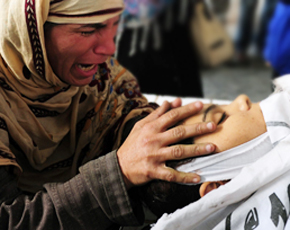
Militants in Pakistan are busy attacking airports, murdering public health workers and minorities, bombing shoppers in markets, and attacking police stations and security professionals. In the past week alone, Pakistanis have endured violence in all its manifestations, robbing them of any sense of normalcy or peace.
Whereas Pakistanis struggle to stay alive in a society corroded by violence, the federal minister for information and broadcasting, Mr. Qamar Zaman Kaira, proclaimed that Pakistan People's Party (PPP) will win the next elections for good performance. The violence-stricken masses will be justified in wondering what gives the Minister such hope when no signs of hope or reprieve could be seen on the horizon. Mr. Kaira though, is not alone in expressing such misguided faith in the electorate. Mr. Asif Ali Zardari, the President of Pakistan, also boasted in a televised interview in January that his party would win the next elections for providing food, clothing, and shelter to the masses.
I would very much like to review the PPP’s performance over the past week to understand what might have motivated the learned Minster to beam with such confidence. As Pakistan slowly implodes under senseless violence, the ruling coalition appears to have lost touch with the reality. Let’s face it, Pakistan is at war and the enemy is within. The past seven days chronicle one of the bloodiest chapters in Pakistan’s recent history where several bombings, shootings, and attacks have targeted civilians and the armed forces alike. The war that started in Afghanistan moved first to the tribal areas of Pakistan and is now being fought in the Pushtun-dominated parts of Karachi, Pakistan’s port city and its economic engine. No one seems to be safe, not even the women administering polio vaccine in Karachi and Peshawar.
The militants choose their targets at will and in most instances are able to strike with devastating consequences. Earlier this week, militants attacked the Peshawar International Airport and caused the death of several civilians living in the vicinity of the airport. Fortunately, one of the two vehicles commandeered by the militants unexpectedly exploded, killing the five militants before they could unleash carnage. The sudden explosion forced the remaining five militants to abandon the attack and flee the airport. The militants were later tracked down in a nearby village where they died in a shootout with the security forces. While the militants were held up by the security forces in Peshawar, a bomb exploded in a market nearby, killing at least 17 people including women and children.
Last week a bomb planted near a tea stall in Karachi killed two, including the shop owner. At the same time, militants attacked a police station near Bannu in the tribal area, killing eight. The dead included three police personnel. One of the militants blew himself up by detonating explosives inside a mosque behind the police station. Across the border in the province of Nangarhar, explosives hidden by the Afghan militants killed nine girls who were aged between nine and 13.
In present-day Pakistan, markets, runways, streets, and villages have become battlegrounds between the militants and the rest where death and destruction follows the young and the old. Members of minority sects and other religions are being killed in targeted attacks. Foreign aid workers, some of whom have lived in Pakistan for decades, are either being killed or abducted for ransom. Teenage girls volunteering to prevent the spread of polio are being killed.
The above is not a summary of events unfolding over a period of few months or a year. Instead, these tragedies befell on Pakistanis in a short span of one week. In fact, similar violent tragedies unfold every week in Pakistan. Add to this the widespread unemployment, poverty, disease, electricity and fuel shortages, and you complete the picture of a failing state and a devastated nation.
I wonder if the PPP leadership realises the implications of winning the next general elections in Pakistan. The expected withdrawal of Nato troops in 2014, which will see the Taliban returning to power in the Pushtun-dominated parts of Afghanistan; the slowdown in aid from the US, which is probable because American policymakers are likely to lose all interest in the region; the State’s inability to borrow even more loans from bilateral donors; and little or no economic recovery in a recession-smitten global economic order are the likely outcomes for the next few years in the region.
Given the expected economic and security handicaps, the next government in Pakistan will be severely constrained in delivering good governance, even if it earnestly wanted to do so. Therefore, whoever wins the next elections should have a better plan to lift this sinking ship back to the surface. The future cannot be more of the same.

The views expressed by this blogger and in the following reader comments do not necessarily reflect the views and policies of the Dawn Media Group.
















































